After achieving a won position in the eighth game of the match, Ding Liren badly misplayed allowing Nepomniachtchi to draw and stay ahead in the race for the 17th world chess champion. The score is 4,5:3,5 for Nepomniachtchi
In a stunning turn of events, Ding Liren squandered several chances in a winning position and ended up playing for a draw in the eighth game of the FIDE World Chess Championship match.
In the Nimzo-Indian Defence, Ding Liren surprised his opponent with a sharp line, sacrificing a piece for an attack on the black king. Nepomniachtchi was caught off guard and, in the critical moment of the game, he misplayed by exchanging a bishop for a knight on e4 on move 22, entering a losing position. At that point, however, Ding made several bad decisions, ultimately squandering his huge advantage.

Despite repeated opportunities handed to him on a silver platter by Nepomniachtchi, Ding failed to capitalize on any of them. By the time the two reached the first time control, the position was even but visually more dangerous for White. The momentum shifted, and Nepomniachtchi seemed to gain confidence as he sensed Ding’s grip on the game loosening.
Ultimately, Ding managed to find solid moves to simplify the position to a drawn rook endgame.

After four and a half hours of play and 45 moves, the two agreed on a draw.
Ding’s own missteps led to his undoing, but Nepomniachtchi’s resourcefulness in finding great defensive moves such as 31…Qh4! And 37…Nxf2!! also deserve credit for this result which allows him to stay in the lead.
In the words of Grandmaster Daniil Dubov: “The players have been playing roulette today… It doesn’t look to me as if this is Ding’s last chance to win a gem in the match.”
A huge opportunity wasted by Ding and a lucky escape for Nepomniachtchi, who maintains the lead.
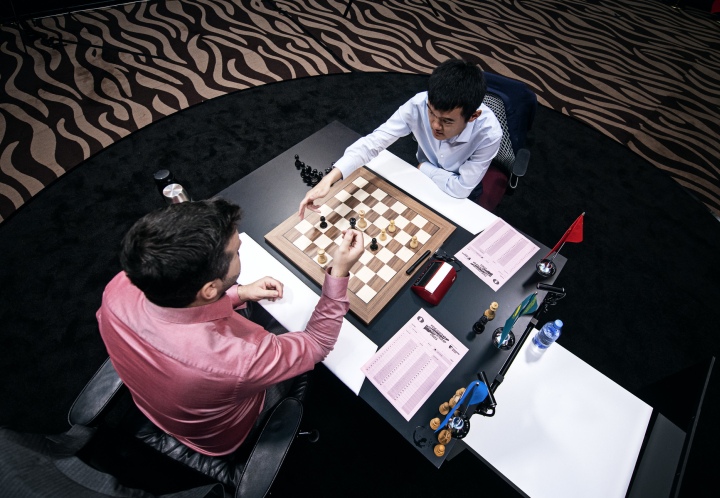
Game nine of the match will take place on Friday, 21st April at 3 PM Astana time.
Here follows a closer look at the eighth game of the match.
Every single game in the match for the title of World Champion in chess is important but game eight in the duel between Ding and Nepomniachtchi in Astana meant more to both players. Game eight was a crucial turning point for both players, and the tension was palpable: if Nepo wins he extends his lead, if Ding wins the race is open.
With the match at its halfway point, Ding had been trailing behind Nepo, evening the score twice before suffering a defeat in the seventh game. Now, Ding had to level the score again, for the third time. Playing catch-up is never easy, especially against a player like Nepomniachtchi, who got his third chance to extend the lead.

If this match has shown anything so far, it is that the players are going for sharp play and a win in each game, without any hesitation or regrets, till the bitter end. That was also the case in game eight.
The opponents tested a relatively rare line in the Rubinstein Variation of Nimzo-Indian, in which Ding was first to surprise his opponent with a rare 9.Ra2, recently introduced by GM Aram Hakobyan.
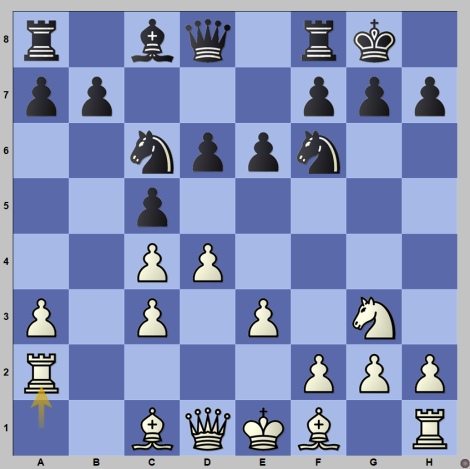
Ding walked off the board after playing this move. Daniil Dubov made a point about this: “This is very typical for chess players. He played Ra2 and left the board, which means Ding is saying to Nepo: I know you had a clue about Bd3, I know Ra2 is good, and I know how a rare move this is, I know the engine doesn’t prefer this as White, and I know you’re out of the book”. Later in the post-game interview, Nepomniachtchi confirmed that he was aware of the move Ra2.
Nepomniachtchi spent some time thinking and opted for the most natural move 10…b6.
10.e4 Played quickly by Ding. White is delaying his castle to seize the initiative in the centre.
10…Ba6 11.Bg5 h6 12.h4! The plan of the line Ding took, going for a sharp position, attacking Black’s kingside.
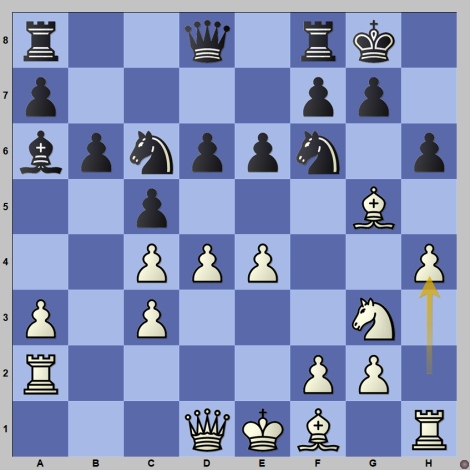
Nepo spent six minutes thinking before taking on g5 and went for a forced line 12…hxg5 13.hxg5 g6
Ding also was taking his time. This was probably all in his preparation, but he was checking the lines. Black’s king is vulnerable on the h-file, and Ding has a chance to increase further pressure with f4. Ding restored the material balance and started spending more time on the clock for each move.
14…Qxf6 15.e5 Playing sharp, opening the space for the knight to jump to e4. “This position is a gift for Ding” said Dubov. Now Nepo got into deep thought.
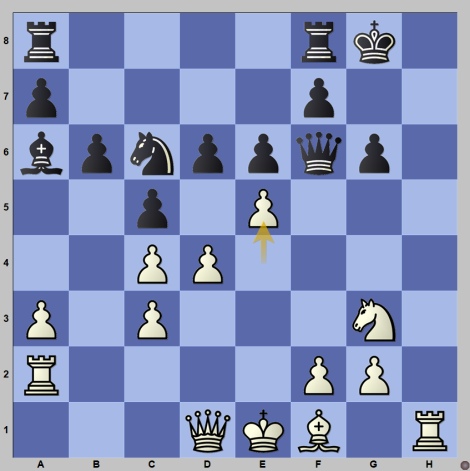
After 15…dxe5 Ding proceeded with 16.d5 sacrificing a pawn to which Ian reacted with 16…Ne7. According to chess engines 16…Rad8 was a worthy alternative.
17.d6 Played after 33 minutes. This was the best choice, preferred by the computer. The position is roughly equal, but White had momentum on his side. But, again, as in previous games, Ding was spending huge amounts of time.
After a series of logical and well-calculated moves, the opponents reached the first critical position of the game.
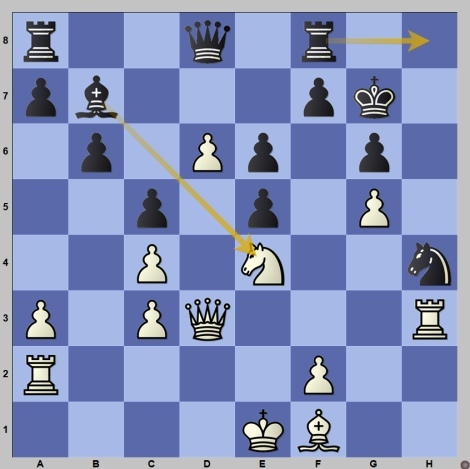
Ian played 22…Be4? This move gave a huge advantage to White. Nepo’s argument was that he believes that his knight is stronger than White’s bishop. He spent 20 minutes on the clock. Ian started feeling the pressure of White’s knight, the d6-pawn is getting better protected. Meanwhile after sensible 22…Rh8 Black is fine.
“He panicked,” said Anish Giri when he saw Nepo taking the knight.
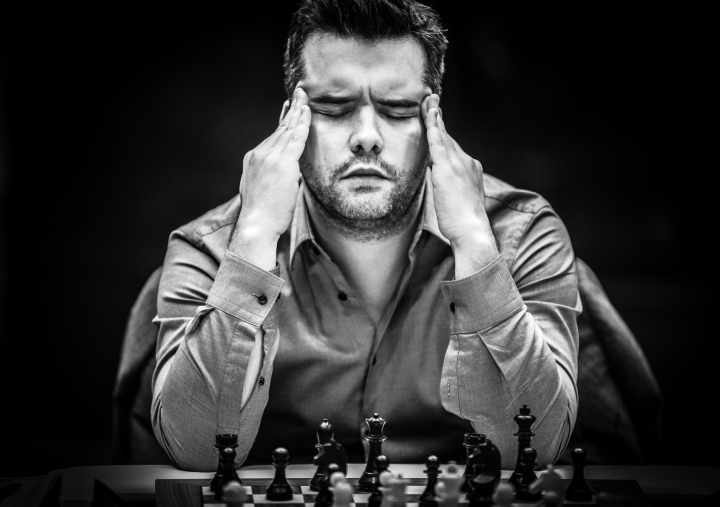
23.Qxe4 Nf5 24.Rd2! Improving his position further and keeping Black on the backfoot. Played instantly by Ding – and the engine also liked this move as the best one.
Black can’t take on d6 because Qxe5 wins a piece. Taking on g5 by Black would give Ding a chance to create a masterpiece on board: 24…Qxg5?? 25.Qxe5+ f6 26.Qh2 Rh8 27.Rxh8 Rxh8 28.Qxh8+!! Kxh8 29.d7 and Black can’t prevent White from promoting his pawn!
Just a few moves down the road, Ding got an overwhelming position but yielded to the temptation of making a natural but erroneous move.
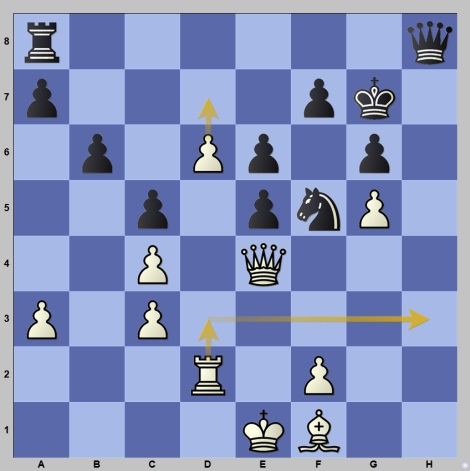
26.d7?! White is still much better but 26.Rd3! realigning the rook to the h-file would have been deadly for Black.
After 26…Rd8 27.Qxe5+ Kh7 28.Qh2+ Kg7 29.Qe5+ Kh7 30.Qh2+ Kg7 Ding repeated the position twice and saved some before playing 31.Qc7.
Again Ian blundered with 31…Qh4? The only move was to place the queen on f8.
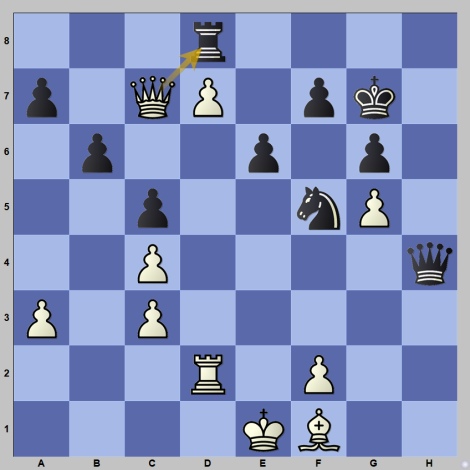
The winning move here was 32.Qxd8, snatching the rook, but Ding feared giving Black chances of a perpetual check. Indeed, the variations are not that easy to calculate, especially in time trouble.
Instead, Ding played: 32.Kd1?, instantly giving away his huge advantage. White was still slightly better but not winning. Ding played this move fast, obviously trying not to repeat the error from game seven where he was defeated by the clock.
After 32…Qxg5 33.Kc2 Qe7 Black got back into the game. However, the pendulum kept swinging as instead of eliminating White’s d7-pawn even at the cost of the knight, Ian allowed Ding to keep it and found himself in dire straits again. However, it was Ding’s turn to err with 36.Bf3??
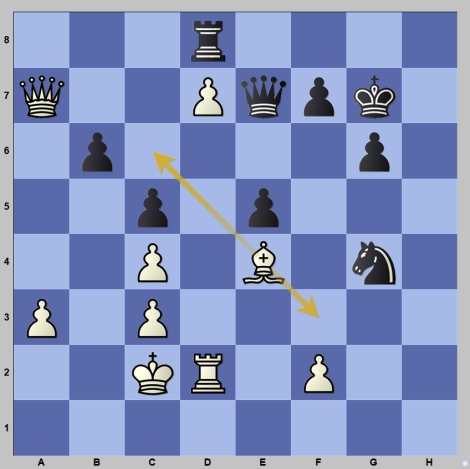
Former world champion Vishy Anand commented: “37.Bc6 should not have been difficult to find. 37.Bf3 was quite careless with enough time on the clock”.
36…Nxf2!! Nepo did not miss his second chance to eliminate White’s dangerous d7-pawn at the cost of the knight. Ian’s body language changed after this move as he quickly realized he had a lucky escape.
After 37.Rxf2 e4! The position is even, but now Black has more play. Looking at the position, Ding shook his head. He lost control of the game.
38.Re2 f5 Now Nepomniachtchi was on top, forcing. The position is even but visually looks much more dangerous for White.
To Ding’s credit, he pulled himself together, and by sacrificing his bishop for a couple of pawns forced a drawn rook endgame in which the two agreed to split a point after four and a half hours. Nepomniachtchi was saved by Ding’s mistakes. The Chinese GM missed several opportunities in the won position but managed to hold his composure and draw safely.

“I felt over-ambitious and made a few moves which cost me,” Nepomniachtchi said after the game.
“After [White played] 24.Rd2 Black is lost, but after Kd1 I had good chances to escape,” Nepomniachtchi added.
Ding Liren was understandably disappointed with the outcome. He said he didn’t want to repeat the situation from game seven when he lost due to time trouble.
“I wanted to play quickly in time trouble, but today it’s another story”.

“A pity. It could have been a good game, but it didn’t happen,” said Ding.
Text: Milan Dinic
Photo: Stev Bonhage, David Llada and Anna Shtourman
Official website: worldchampionship.fide.com/
About the match
The 2023 FIDE World Chess Championship match between Grandmasters Ding Liren and Ian Nepomniachtchi takes place from 7th April to 1st May 2023 in Astana, Kazakhstan.
The match will consist of 14 games, followed by a rapid/blitz tiebreak in case of a tie.
The time control for the standard games is 120 minutes for the first 40 moves, followed by 60 minutes for the next 20 moves, and then 15 minutes for the rest of the game, with an increment of 30 seconds per move starting from move 61.
The first player to reach 7,5 points in the 14 games will win the match. If it’s a tie, the two go to tiebreaks.
The prize fund for the match is two million euros, with the reward being split 60:40 between the winner and the runner-up.
The main Partner of the match is Freedom Holding.








